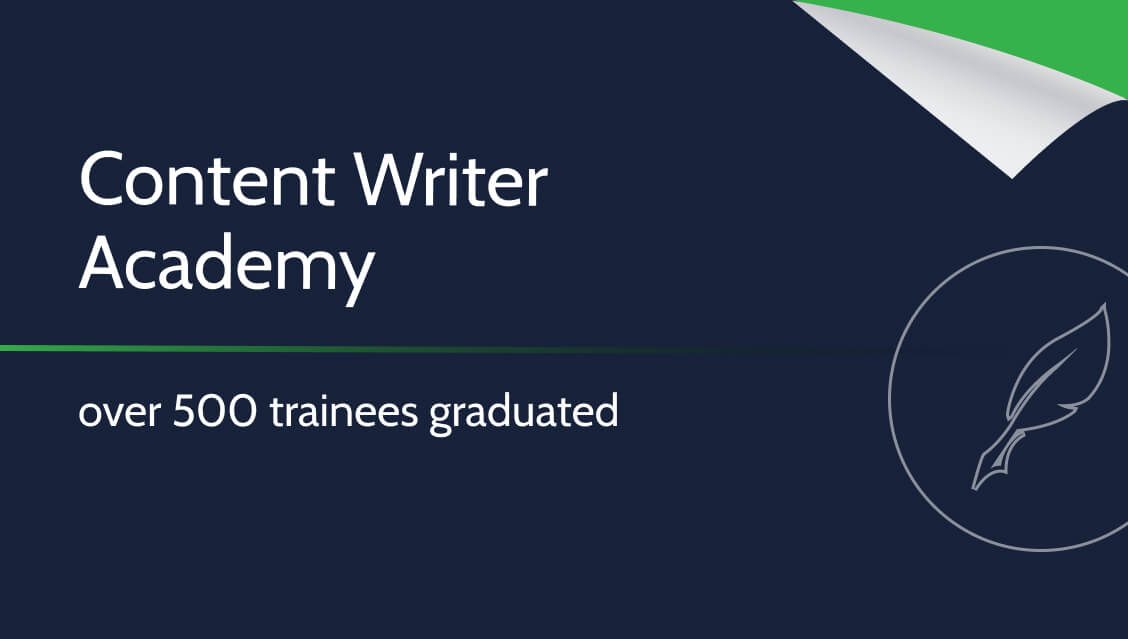Content Writer Academy has graduated 500+ trainees

Thousands of people begin their writing careers each year and, interestingly, a growing number of them decide to choose Content Writer Academy to launch their careers.
Content Writer – a leader in the training industry
I spoke with the Head of Academy, Julia Markiewicz, about what the training of copywriters by Content Writer Academy (CWA) looks like and what distinguishes Content Writer courses.
Excerpts:
Question: What does the Content Writer Academy actually teach, to begin with?
Answer: The Academy’s flagship service is the copywriting course and proofreading course. Currently, I am unable to determine which of them is more popular, as it seems that both industries are gaining in importance. However, the training formula itself is identical in both cases: the participant performs tasks in practice, and then receives feedback from his or her supervisor. This is a simple principle, but it distinguishes us from other educational institutions.

Julia Markiewicz
Question: When did you start teaching by practice?
Answer: From the very first days of the founding of the Academy. As soon as we obtained an entry in the RIS (Register of Training Institutions – editorial note), we put teachers on alert. In our opinion, there are many advantages about this, both for students and for the agency. First of all, the trainee receives feedback regarding his or her work – as a result of this, s/he quickly draws conclusions and performs subsequent tasks better. As a result, we have at our disposal a pool of talented people that we can hire. This significantly facilitates our recruitment processes and helps us to build a stronger team of copywriters and proofreaders.
Question: Who are your students? How many of them go on to get jobs?
Answer: You can’t generalize like that; our trainees represent a cross-section of the society. They are young and old people. Some are students who want to get a profession, while others already have a permanent job and are expanding their horizons. Some still are just learning to write well, while others just want to polish their writing skills – the list goes on and on. However, as for working in our agency, we have specific data, which currently (as at May. 2023 – editorial note) stands at 520 Academy graduates, out of which 120 have been employed. Since last year, it has been invariably about a quarter of all participants of the Academy and we consider that a good result.
Question: Do your courses in any way improve prospect of employment?
Answer: Of course, our observations also show that the vast majority of graduates have better skills than people who apply for a job without prior contact with our training department. That is why we try to recruit mainly among our graduates, which ultimately shapes this result. In addition, we are sure about the candidate, because sometimes it is not only about writing competences, but also organizational ones, and we are also able to verify this during the training.
A CV can, to put it gently, pass for the truth, but working with a trainee for a few weeks tells us a lot. However, all of this is merely our agency’s point of view. Additionally, we must keep in mind that the participant develops his portfolio throughout the program, making it simpler for him to land a position at other businesses. Since we frequently communicate with some grads, we are aware that situations like these frequently occur.
Question: Do you think that your teaching style – I mean learning through practice – can work in other industries?
Answer: Of course, it can. Not only that, I consider it a necessary requirement for training companies that want to stay relevant in the grand scheme of things. Let’s start with the fact that we function in an information society. Knowledge is at your fingertips, fast and free; So what is the added value of the course nowadays? I talked about it with many people in my circle and there is still a belief that the basis is the consolidation of information. Tha=e arguments that ‘Since the data is publicly available, let’s at least choose useful content from this chaos and make it available to students.,’ does not convince me.
In my opinion, it is obvious that nowadays the course must be more than a dry transmission of knowledge. It is necessary to build a relationship with the student, adapt learning to his requirements and, above all, support him or her on the labor market – because this is what science is ultimately for. That is why individual contact, building a portfolio, providing tools or other boosters depending on the industry are so important. Modern courses must build a unique base for development, not just provide information. And I hope that will be a common point of view in the nearest future.
















Comments
Hi Thanks for this helpful Interview session.
It sure did answered a lot of my questions except one.
Which is, just in case I have issues with the Card payment route which other way can I pay for the course.
Hi Emmanuel, we use a very reliable payment processor, as such we hardly have issues with card payments.
But in the unlikely case of having issues with card payment, visit here to get our bank details and make direct payment into our account number, then email your proof of your payment to us.
Thank you!